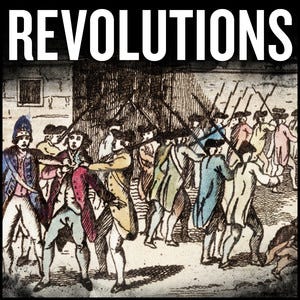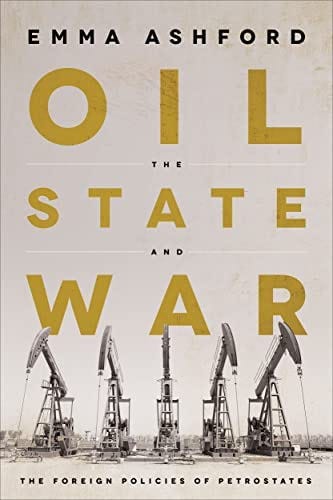It’s almost the end of 2022, and I suspect we’re all glad to see the end of that one. Here in the post-end-of-history-era, things never seem to slow down for long!
But the end of the year also brings an opportunity to plus-up our bookshelves, as every publication provides lengthy lists of “best books of the year.” So in that spirit, here’s my list of the best books and podcasts of the year at the extremely specific intersection of my own research interests: grand strategy, economic statecraft, Russian politics, science fiction, and energy politics.
Politics, Economics, and History
Chip War: The Fight For the World’s Most Critical Technology, Chris Miller. I’m a bit of a luddite, but Chris Miller’s book on the entangled web of US national security with the global semiconductor industry over the last four decades was engaging enough to keep even me interested in the technical details. For Miller, semiconductors enabled America’s cold war victory and its military preeminence over the last few decades. The key question then becomes: can the U.S. constrain China’s rise in this space? If you’re curious about recent semiconductor export controls, this one is for you.
Crashed: How a Decade of Financial Crises Changed the World, Adam Tooze. Tooze is everyone’s favorite economic historian, but I was new to his work this year, reading The Deluge, and The Wages of Destruction in addition to this book. It was, however, this book that I found compulsively readable. Crashed is from 2018, but still stands up well. More importantly – and unlike most histories of the financial crisis – it’s also decidedly un-self-congratulatory. That lets Tooze connect seemingly disparate events across the sweep of a decade: the 2008 financial crisis, the Maidan Revolution in Ukraine, Brexit, and the rise of Donald Trump to show that the turmoil of markets in the early 2010s was not handled as well as we often assume.
The Economic Weapon: The Rise of Sanctions as a Tool of Modern War, Nicholas Mulder. It was pretty much a given that I would love this book. But I had not expected it to be so thoroughly – and in some ways terrifyingly – relevant to geopolitics in 2022. Mulder explores the development of sanctions in the 1920s, when the allied nations first used their economic might to crush Germany’s economy, and then departed from existing global norms to repurpose economic sanctions as a way to punish wayward states in the international system. It explores the early development of sanctions as a tool – both of warfare, and as an alternative to it. As the Western world once again turns to extreme forms of economic coercion against Russia – and increasingly China – this book is far too relevant for comfort.
Before and After the Fall: World Politics and the End of the Cold War, Eds. Nuno Monteiro and Fritz Bartel. This edited volume takes an interdisciplinary view of the post-Cold War period, bringing together strategists and historians to explore why the ‘new world order’ that George Bush Sr. so famously anticipated failed to emerge in the 1990s and 2000s. In 2021, when this was published, it seemed that the book’s biggest flaw might be that it was too focused on Russia and the legacies of the Soviet collapse, and too little on the rise China; in 2022, this seems almost a virtue. With chapters on the spread of autocracy, the politics of NATO enlargement, and the arc of post-Cold War US grand strategy, it has a bit of something for everyone.
The Sleepwalkers: How Europe Went to War in 1914, Christopher Clark. I started reading this book in December last year, and was favorably impressed enough by the opening chapters that I put it on my 2021 Christmas reading list. But after getting distracted and coming back to it in February this year, it belongs here too, not least because of the juxtaposition of Clark’s detailed and distressing history of Europe’s march to war in 1914 with the February 2022 Russian invasion of Ukraine. In 2021, the start of this book read like a historical case study; by 2022, the end of the story seemed all too close for comfort, as the characters and events tripped off Clark’s page in ways curiously reminiscent of today’s interconnected world, and ways which highlight the all-too real risk of accidentally sleepwalking into major war.
Isolationism: A History of America’s Efforts to Shield Itself From the World, Charles Kupchan. If you’ve ever expressed publicly the notion that America should pursue a less ambitious global agenda, you’ve probably been called an isolationist. If you’ve ever done so on Twitter, they probably threw in some cuss words for emphasis. And like many ‘restrainers,’ or ‘realists,’ I’ve often laughed at this characterization, which equates military activism with actual global engagement. Kupchan, however, takes a different tack in this book, looking at the historical record of America in the world. The result is a nuanced and interesting history that suggests not only that accusations of isolationism are caricatures today, but that they have always been so. America used to regard itself as exceptional in standing above the world’s petty struggles; today, in contrast, we view ourselves as exceptional in seeking to solve those problems. Both viewpoints are uniquely American.
Dis-honorable Mention
Oil, the State, and War: The Foreign Policies of Petrostates, by… well, me. My book on petrostates and their foreign policies was published in June of this year. It might seem like a bit of a niche topic, but part of the book’s core argument is that petrostates are more numerous, diverse, and integrated into international affairs than you might think. With sections on petrostates and conflict, oil prices and the global arms trade, proxy sponsorship, the ‘oil weapon,’ and where petrostates will fit in the ‘green transition’ over the next few decades, you will probably find something in there that interests you! Not to mention the sections on Russian military modernization, and the energy politics of the post-Soviet space, which ended up being a little more real-world relevant than I anticipated So check it out, and I promise that 2023 will have less self-promotion.
Podcasts



Columbia Energy Exchange. There are surprisingly few publications out there that put energy issues in layman’s terms, and fewer still that are focused on policy questions, rather than aimed at markets and investors. The Columbia Energy Exchange podcast is a nice exception to that rule, providing wide-ranging and accessible conversations on a variety of energy market, technology, and climate issues.
Revolutions. This podcast may well be familiar to you already. But with the series reaching the end of its near-decade long run, it’s a great time to check it out if you haven’t already. Mike Duncan’s history of world revolutions takes you through the grand sweep of modern history, and surfaces a lot of interesting interconnections that you might not have expected. Being a regular listener to the series has also reinforced my existing believe that structural factors will never get you 100% of the way there; the secret sauce of historical advancement is always the spark of human agency.1
American Prestige. I’m biased because I’ve been a guest on this show a few times, but it’s hard to overstate how much more useful this podcast is than many of your standard issue, generic DC policy-discussion podcasts. Here, the hosts bring on interesting guests – mostly from academia – who know their subjects well, and can get into the nitty-gritty of history and politics. There’s a free version, or – if you’re feeling generous – a paid subscription version.
Fiction
The Kaiju Preservation Society, John Scalzi. This book is every bit as dumb as it sounds from the title, and is even better for it. It’s the novel equivalent of fast food, but a surprisingly good read. If you’ve ever wondered where Godzilla legends came from and whether they’re still relevant, this one is for you.
A Memory Called Empire, Arkady Martine. At the other end of the spectrum, we’ve got some serious science fiction. A Memory Called Empire and its sequel are political and military thrillers with a side of linguistic and cultural conflict thrown in. More importantly, they’re a meditation on the subtle ways that empire extends its hold on neighboring polities, and on the question of whether expats or country experts – once corrupted by a foreign culture – can ever really go home again.
All Fun and Games Until Someone Loses an Eye, Christopher Brookmyre. I re-read this book whenever I’m feeling down. It’s a fun romp with an unlikely heroine – or as my husband describes it: ‘Glaswegian housewife James Bond fan-fiction.’ Jane Fleming is a stay-at-home grandma, at least until she’s pulled into a world of spies, defense contractors, and hired killers, where it turns out that the skills she learned in 25 years of parenting are remarkably useful in outwitting the baddies who are gunning for her family. Pure escapism.
My 2023 Reading List
My reading list for 2023 is already full of promising reads, and I’m looking forward to cracking into these in the new year. In no particular order:
Euromissiles: The Nuclear Weapons That Nearly Destroyed NATO, Susan Colbourn
The Religion of American Greatness: What’s Wrong with Christian Nationalism, Paul D. Miller
The Danger Zone: The Coming Conflict with China, Hal Brands and Michael Beckley
Bucking the Buck: US Financial Sanctions and the International Backlash Against the Dollar, Daniel McDowell
Megatrends, Nouriel Roubini
Accidental Tsar: The Life and Lies of Vladimir Putin, Andrew Weiss
The Triumph of Broken Promises: The End of the Cold War and the Rise of Neoliberalism, Fritz Bartel2
Pacific Power Paradox: American Statecraft and the Fate of the Asian Peace, Van Jackson
SPQR: A History of Ancient Rome, Mary Beard3
This is probably why I’m a terrible political scientist, and should have been a historian instead.
With massive apologies to the editor for whom I have not yet completed this review.
Because I have never read Roman history, at all, and it’s about time I did so.







Nice list! Some here that show up on mine (coming next week, I bet you can guess which ones) and some I’ll need to add to next years. Here’s to more discussions next year!